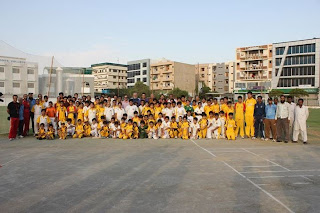By Syed Khalid Mahmood
(Pakistan News & Features Services)
(Pakistan News & Features Services)
Former Test fast bowler and Level-IV cricket coach, Jalaluddin, has prepared a plan by the name of Karachi Under-15 Grassroots Players Development Programme aimed improving the standard of the game on a long-term basis.
The programme, to be spread over three months, could be organized at a total cost of Rupees five million to extract the top 20 cricketers of the city below the age of 15 years.
Jalaluddin, who is the highest qualified coach of the country, has developed the plan which is tailor-made for the Karachi City Cricket Association (KCCA) which has seven zones in its folds.
According to the programme, in the first phase, all the seven zones will be required to send their top 30 players for selection to the panel of coaches to be headed by Jalaluddin and having a few other qualified and trained coaches.
The coaches of panel will shortlist 20 players from each zone and the selected lot of 140 cricketers will be taking a coaching programme of one month, three days a week, in the second phase.
The focus, during the one-month coaching programme, will be on basic skill development, game sense training, fitness programme and team building.
In the third phase, the seven zones will be engaged in a tournament to be played on single league basis in which 21 matches will be contest over a period of two weeks. The matches will be played on alternate days and they would be 40-overs-a-side contest.
In the fourth and final phase, to be spread over one month, the selection of the best players will be made on the basis of their performance. The selected 20 cricketers will be taking two-week training in an advance camp before undertaking a tour of the Punjab or abroad for a couple of weeks. At the end of the programme the performance of the selected cricketers will be evaluated for future planning.
Jalaluddin, who is expected to submit the plan to the KCCA as soon as the new office-bearers are elected sometime in August, appeared confident about its approval and subsequent implemented.
“It’s wholly in the interest of Karachi cricket.
The objective of this plan basically is to produce quality cricketers on a consistent basis. Ideally the pilot project should start as early as September. I am quite positive that the KCCA would be facilitating the project,” he hoped.
“There has been a lot of cricket played in Karachi but the quality has remained an issue and the city has not produced a decent number of outstanding cricketers despite the abundance of talent. This has happened because mostly cricket is being played for fun or recreation. By introducing this programme we desire to let our boys get an exposure to professional coaching from the age of 15,” Jalaluddin explained.
“When these boys will grow, having played quality cricket under the supervision of qualified coaches they will obviously be in a better position to perform at higher levels. That’s the core objective. Our youngsters should be getting proper guidance and training for unfolding their skills,” he added.
Jalaluddin, having vast coaching experience, was convinced that a revolution of sorts will be brought about if the plan was carried out every year which will ensure a very bright future for the cricketers of Karachi, who will feel much more comfortable graduating to the higher levels.



















